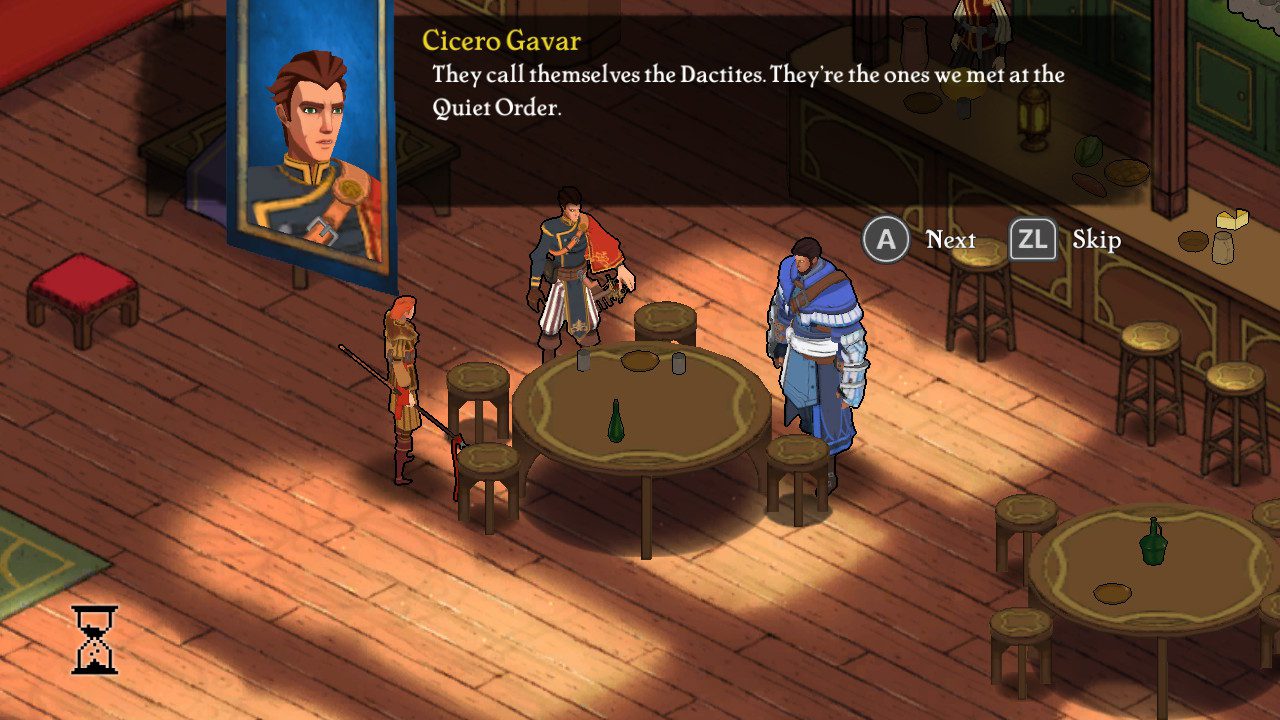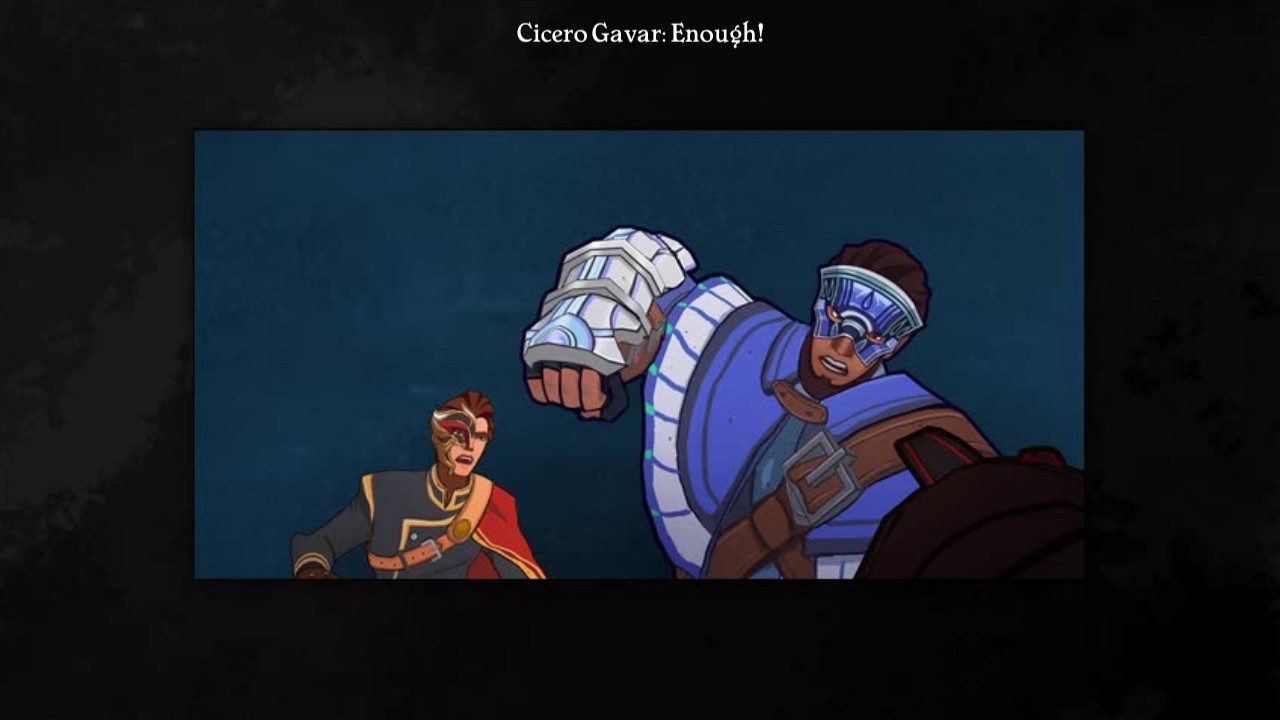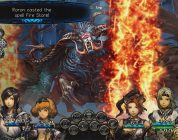Role-playing games are some of the most beloved games of the medium. When looking at lists of must play games or an all-time ranking, there’s almost always a spread of RPGs at the top. This is why for developers, an RPG has to be a fairly daunting task, especially when trying to make something large in scope that will stand the test of the time. Masquerada: Songs and Shadows has all the elements of an excellent RPG but lacks the cohesion to make it truly wonderful.
Masquerada is a tactical RPG that involves a world where magic is performed through artifacts called Mascherines, powerful masks of varying shape and ability. The Mascherines are an item that is tracked by a Registry and given out to those deemed necessary to own one. These range from Citte guards to more specialized agents to thugs called Mask Runners. Most interesting is that these Mascherines are a finite resource and they are destroyed upon the death of their wearer. This is just one facet of the well-realized world of Masquerada. With enough time and by reading enough of the many codex entries, one can really get lost in the details.
This level of detail mainly stems from the game’s design being sparked by years of tabletop role-playing in this game’s world. I actually played Masquerada at PAX East 2017 alongside creative director, Ian Gregory. During that demo session, he told me about the years and years of fine-tuning the Venetian fantasy world through Dungeons & Dragons. This is why the game’s voice cast is quite fitting with voices like Felicia Day, Matt Mercer, Jennifer Hale, Dave Fennoy, and Ashly Burch creating a narrative that feels substantial. Before that, the game caught my attention as it hit Kickstarter.
The story and world building are the two biggest strengths of Masquerada: Songs and Shadows. Dialogue is almost always spoken and was recorded in a way that it flows like an actual conversation. Plot points establish interest pretty quickly and characters have some depth to their actions and speech. As a big fan of fantasy literature, I found myself really enjoying the almost novel aspects of Masquerada.
This is all tied to a hand-drawn world in an isometric view that reminds me of ink-focused, geometry driven comics. This also carries over in the cutscenes, which use paneling like a comic book in a style that is admittedly found in a lot of other games but can add a bit more drama to the scenes they appear in. The game’s soundtrack is also pleasing to the ears and can further pull players into the game.
What’s striking is just how much potential Masquerada has. All of the elements of an incredible RPG are here: excellent writing, a diverse cast of interesting characters, a detailed and unique world, beautiful art and music. Yet, these elements are overshadowed by the technical failings and mechanics at work.
For context, I’m playing on the Nintendo Switch for this review, but I’ve also played the full version on Steam and an early build on PS4. Immediately, I was taken aback by the length and frequency of load screens. In almost any game this can be a problem but it is striking how annoying they become over time. Masquerada’s worlds are explored in chunks and each chunk has a circle the player steps into to progress to the next screen. The issue here is that these chunks are typically not very large and the game has to load upon entering any area. Navigating Masquerada feels incredibly slow due to this.
The game also loads after conversations and scenes. There are some scenes that have a side view of a carriage as it travels the city, which I had hoped had been a way to mask a loading screen but this doesn’t appear to be the case. If there was a way to load chunks in the background so that the transition is more seamless, this glaring issue could have been avoided. Depending on how the game was coded and built this is an issue that can be addressed in an update. I also experienced some screen tearing when moving that jiggles characters enough to be irritating.
The game’s combat is also something that I found myself unusually uninterested in. The combat in RPGs is something I’ve always enjoyed tinkering with, finding efficiencies in my menuing or making mental notes of enemy weaknesses. The problem is that Masquerada tries to mimic Dragon Age Origins but doesn’t quite hit that level of fidelity.
The action happens kind of like a smaller scale Diablo fight with the ability to pause to direct each party member. Special abilities are mapped to face buttons and do have some layering depending on what’s been cast. Party member behavior can also be tweaked. Yet, because the action moves so quickly outside of a pause, it’s easy to get lost in the chaos. There could have been more visual elements and punch to the animations to drive home what’s being done, but I honestly think the battles could have been more interesting as a turn-based affair. Thankfully there is a difficulty that makes battles way easier, which is what I switched to after a few annoying battles.
Progression is tied to skills that are chosen for each character, so there is some slight customization for those that like to tinker. The differences didn’t feel substantial for most characters, but there are four classes to pick from for the main character Cicero. I opted for the earth Mascherine Quagmire. I typically used an Area-of-Effect spell to slow down opponents, summoned mud dragon turrets to dish out damage, and then hammered away with my other leftover spells. It’s a combat style that seems to work really well and I while I didn’t much care for the game’s combat, I liked the types of spells each character had.
Overall, Masquerada is one of the most high-potential games I’ve ever played and I will be keeping a close eye on the developers to see what they make next. With better flow to the game and a more interesting combat system, this could have been a stellar title. Since the game has a subtitle and I know that there has to be more to pull from the D&D games that inspired it, I hope to see a sequel. I also would like to see some patches address the load times on the Switch as this sort of game usually shines on the handheld.
Unfortunately, in the game’s current state I likely won’t finish Masquerada: Songs and Shadows, but for those looking for an interesting world and story with some pretty solid voice acting, it’s a solid game to pick up at its price point.
For more information on Masquerada: Songs and Shadows, check out the official website. A digital copy of the game was provided for review purposes.








